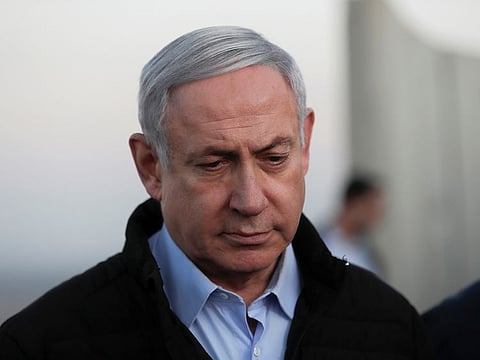Why Netanyahu's anti-Arab campaign didn't work
The 1948 Palestinians succeeded in polls despite overwhelming odds

Many political and ideological polarisations took place over the last three Israeli parliamentary elections. They indicated the failure of the segregation—based moves of the Likud, Blue and White, and Israel Our Home parties along with the Right Bloc, imposed against the 1948 Palestinians.
Rather, those undemocratic attempts were counterproductive as the Arabs became united in the Joint List on the one hand, and their participation rate was higher in the elections, especially among youth and women, on the other.
The percentage of voting in the Arab population of Israel was 65%, an increase of 5% over the September 2019 elections and 15% over the April 2019 elections.
The significant momentum of Arab participation was due to the negative intentions and attitudes of the exhibited by the majority of present Jewish politicians towards them, while they came to realise their political strength and the necessity of using it
What happened in the midst of the 1948 Palestinians is an important development brought about among other factors — by the racist wave unleashed by the current leaders of those Israeli parties: Benjamin Netanyahu, Benny Gantz and Avigdor Lieberman (respectively) and the Right Bloc.
According to Israeli economic analyst Merav Arlozorov, ”64.7% of the eligible voters among Arab citizens voted in the elections for the 23rd Knesset. We never recalled a group of voters who increased their voting rate in this way within a year.
High voting rate
This is the highest voting rate among the Arabs since the 1999 elections, when 75% of the Arabs went to the polls to help elect Ehud Barak as prime minister.”
She concluded that “since the Israeli statistics show that the 1948 Palestinians constitute 16% of those who have the right to vote in Israel, their share in the Knesset seats should be 19 seats”. But Arlozorov noted that “15 seats are an amazing achievement by all standards.”
Also Read: Israelis masking true motives on Palestine
Also Read: Palestine needs a culture of resilience
The significant momentum of Arab participation was due to the negative intentions and attitudes of the exhibited by the majority of present Jewish politicians towards them, while they came to realise their political strength and the necessity of using it.
Thus, the 1948 Palestinians have managed to overcome their reluctance to vote and the low turnout, as well as the dispersion of their votes between competing Arab lists and parties, with part of them going to the left and even to the Zionist parties.
In fact, it is possible to talk today about a great agreement and harmony among the components of the 1948 Palestinians, allowing to reduce the influence and representation of the Zionist parties in the Arab environment.
Heated right-wing rhetoric
The ‘credit’ for all of this is due to the Israeli right’s policy of excluding Arab citizens in a climate of a heated Zionist nationalist and religious right-wing rhetoric.
All of which have resulted in a decline in the influence of Arab ultra-nationalists and Islamists in the areas of 1948 Palestinians calling for a boycott of the Knesset elections for religious and left-related reasons.
At the forefront of incitement policies and positions is the policy and position of Netanyahu who is clearly afraid of the political outcome of the 1948 Palestinians.
Criticism within Israel
In this context, the former Israeli Prime Minister Ehud Olmert voiced his criticism saying “a similar atmosphere was imposed by Netanyahu in the three election campaigns over the past year. All of this was the prevalent tone.....formulated in a way that cannot be mistaken.
Netanyahu said practically that about two million (Palestinian Arab) citizens are traitors. Olmert added: “He (Netanyahu) told the (Jewish) public the choice is in their hands to either vote for the Jewish and Zionist state of Israel or for those who want to annihilate it. There is no possibility to understand things differently”.
Israeli writer Udi Friedman explained: “Netanyahu says he won the elections, well. Netanyahu, you (alone) cannot form a government. So what will you do now? You will do what you always do, and what you know well is distortion and arousing fear and terror.”
He goes on asking: “What do you fear so much? What did the half-million Arab voters do for you, the loyal citizens whom you fear most? Are they the ones who enabled the health system to collapse?
Are they the ones that caused the deterioration of the education system? Are they who dragged us into three electoral rounds because of an indictment (against you) over bribery, fraud, or breach of trust? No, you did it all.”
Among the multiple attempts of the current Israeli leaders to limit the entry of the Palestinian Arab minority into the Israeli parliament (the Knesset), was the attempt to raise the electoral threshold to 3.25 of the percentage of voters entering the Knesset.
The idea was that the Palestinian Arab parties will not ally themselves, as is the custom of Arab parties everywhere. But when Benjamin Netanyahu incited the Palestinian representatives as “supporters of terrorism”, the Palestinian vote jumped to 65%, and the Palestinian Arab minority succeeded in winning the unprecedented 15 seats.
Professor As’ad Abdul Rahman is the chairman of Palestinian Encyclopaedia.


